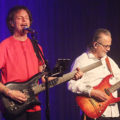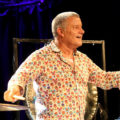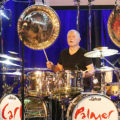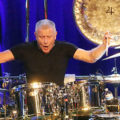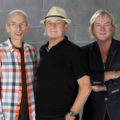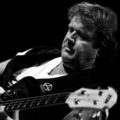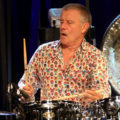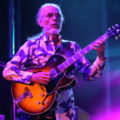ELP spin-off singer Robert Berry revives the ghost of Keith Emerson via 3.2’s “Third Impression”
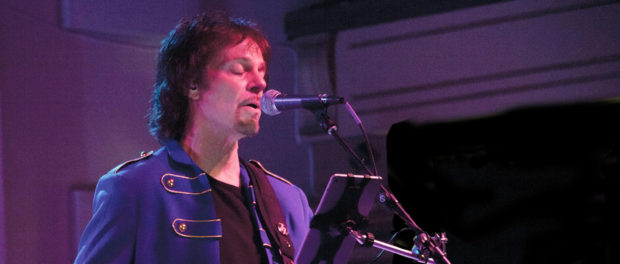 Photos provided by Dave Lepori
Photos provided by Dave Lepori
Towards the end of 1980s, the unpretentiously titled 3 gave The Nice turned Emerson, Lake & Palmer keyboardist Keith Emerson and bandmate/Asia drummer Carl Palmer a glossier pop/rock perspective than their progressive roots, while it propelled singer/guitarist/bassist Robert Berry to international awareness thanks to the Top Ten single “Talkin’ Bout” and a tour culminating with the Atlantic Records 40th Anniversary Celebration at Madison Square Garden.
Shortly thereafter, ELP reunited and Berry bounced between a solo career, running a recording studio and several groups (Sammy Hagar, Alliance, December People, Ambrosia, Greg Kihn Band) until totally out of the blue in the 2010s, a Facebook fan page popped up, two archived concerts were officially released and Frontiers Records put an offer on the table.
As a result, Berry coaxed Emerson into writing together again (as Palmer rejoined Asia and started ELP Legacy), but then the unthinkable happened when the latter tragically committed suicide in 2016, leaving his heartbroken collaborator to meticulously reconstruct every note of their rough drafts on what ultimately became the aptly rebooted 3.2’s “The Rules Have Changed.”
Response was so overwhelming that it sparked a follow-up, “Third Impression,” so “welcome back, my friends, to the show that never ends…come inside, come inside” to hear Berry fill Chicago Concert Reviews in “From The Beginning” about what a “Lucky Man” he was to play alongside the prodigious pair and all that followed.
How many of these musical seeds were sewn in your final moments with Keith Emerson compared to entirely new ideas that came after he was gone?
 Robert Berry: On the previous albums, “The Rules Of Change,” almost all of them were Keith and I writing together. We had about six of them close to completion when he died. The reason I didn’t want to do a third album was because I only had one piece left, but it was a nine-minute piece. It was really not even close to finished form, so it didn’t really seem to me like it was right for the last album. When the record company said, “you really should do a follow-up,” cause “The Rules Of Change” did so well, I thought, “if I can write six or seven songs that I think are worthy of a 3 album, then I’ll go ahead and finish the last song that Keith and I wrote together,” which was called “Never.”
Robert Berry: On the previous albums, “The Rules Of Change,” almost all of them were Keith and I writing together. We had about six of them close to completion when he died. The reason I didn’t want to do a third album was because I only had one piece left, but it was a nine-minute piece. It was really not even close to finished form, so it didn’t really seem to me like it was right for the last album. When the record company said, “you really should do a follow-up,” cause “The Rules Of Change” did so well, I thought, “if I can write six or seven songs that I think are worthy of a 3 album, then I’ll go ahead and finish the last song that Keith and I wrote together,” which was called “Never.”
So I got seven songs and went, “wow, these are actually coming out pretty good I think,” so I started working on “Never.” I didn’t realize what a great piece of music it was and how it’s so Emerson-ish. When you hear it, you go, “he had to have written that!” And it turned out maybe to be as good as, if not better than, “Desde La Vida,” all the way back to the first album [“To The Power Of Three”] in 1988. It’s a big piece of music and everybody’s just talking about how great is it as far as the Emerson stuff…We had a real meeting of the minds about style, about what we didn’t get right in 1988, what we want to do now, honoring the past and bringing it into the present. This album continues with that because we spent so much time talking about what we wanted it to be. The record company and my manager all said, “you’ve gotta put this album out.”
Did finishing this project help bring closure to your relationship with Keith?
Berry: It’s hard for me to talk about. It’s a little bittersweet for me cause I had this one song sitting here in the hard drive. I’m talking to you from my studio, Soundtek Studios, where we did a lot of recording and I work just about every day. Keith and I were working together and it sort of kept him alive here at the studio. Now it’s gone out to the world and that’s it. That’s the last song that Keith and I have worked on together, the last thing he ever did in his life. His son encouraged me to finish it and put it out too, so it’s just a little bittersweet, you know?
Is any of his playing on the project or are they reconstructions of your sessions?
Berry: I had his playing on everything when I went to release the last album. The Emerson Estate board, which isn’t his son, said they didn’t want me to use any of his writing, any of his playing or any of his music. I said, “well, we had agreed to do this. Keith was into it and there’s money to be made for his estate, if that’s what you’re worried about.” “No, we want him remembered as just a composer, so you can’t use it.” I fought with them for a while and then I finally just said, “you don’t know what Keith contributed to this album. I’m just gonna put it out. You’ll never know and you can’t prove it cause I’m the only one who knows, if that’s the way you want to play the game.” They got back to me and said, “okay, well, you can use what he wrote, but you can’t use his playing.”
 So I had to recreate every sound he played. Luckily, I have a Moog that he uses. I started as a keyboard player and I do a lot of keyboard stuff in my studio all the time with people. I had the right instruments, but I had to painstakingly recreate every nuance and every sound that he had played, which by no means does it mean that I’m as good as him. It just means that I can copy his parts and I’m capable of playing them. That’s what happened on the new album. They don’t want me to use any of his playing. They just let me use his writing and his input to the whole thing, so I had to painstakingly go in again, use a Moog and do all the keyboard stuff. It’s sorta like taking a Xerox copy of a picture. It’s still the same picture, it’s just been copied.
So I had to recreate every sound he played. Luckily, I have a Moog that he uses. I started as a keyboard player and I do a lot of keyboard stuff in my studio all the time with people. I had the right instruments, but I had to painstakingly recreate every nuance and every sound that he had played, which by no means does it mean that I’m as good as him. It just means that I can copy his parts and I’m capable of playing them. That’s what happened on the new album. They don’t want me to use any of his playing. They just let me use his writing and his input to the whole thing, so I had to painstakingly go in again, use a Moog and do all the keyboard stuff. It’s sorta like taking a Xerox copy of a picture. It’s still the same picture, it’s just been copied.
Do you view this as a companion to “The Rules Have Changed” or a stand-alone collection?
Berry: I consider 3’s “To The Power Three,” 3.2’s “The Rules Have Changed,” and now, “Third Impression,” the trilogy in the style of 3. This is the last song I have of Keith and the final album. I worked with Keith on the last two. Carl, Keith and I did the first one. Honestly, I don’t want to do one on my own. That’s not a 3 album. It needs to have at least Keith and I working together. You can see the progression. You can see from the first album how we were trying to find what was best for us. You can see on the second album that it really came together. You can hear on the third album where the second album brought us to and how I’m moving on a little bit to what might happen in the future, so I think it’s complete as a set.
What is your relationship with Carl Palmer like these days?
Berry: It’s very good, but he is so dedicated to the ELP Legacy being the only guy left, he didn’t want to be involved in anything else. Of course, he does the Asia tour here and there, but he’s mainly focused on the ELP Legacy. Keith and I became closer friends over the years cause he lived in L.A., we talked and we did some projects together. I don’t talk to Carl as much, but he calls me when he comes to town. “Why don’t you come on and spend time catching up?” He’s a good guy. Carl was a real motivating force in the first 3 album as far as touring, getting the budget and getting the band together. He’s just got a great business mind, and of course, he’s a great drummer, hello!
Can you remind readers how you initially got in touch with those two?
Berry: I could never have gotten in touch with them. I wouldn’t know how to call ‘em, and no one would give me their number if I really wanted to, so it’s funny that I [heard from them]. My first solo album was just songs I had done at the studio here and a pressing company in Taiwan offered me 300 free vinyl albums if I used their company. So I sent them songs I had done that my band Hush, a local band I did pretty well with, couldn’t do. They were just different. It’s called “Back To Back” and I gave some away [in 1984]. My very good friend, Rob Fowler, who does my website and was in my solo band, sent these albums out to all the record companies.
 John Kalodner at Geffen Records really loved the material on this album and he called me. I was so shocked. I thought, “really?” That was just a bunch of songs that I kind of put out. I didn’t know that Rob had sent the songs to all these record companies. So Geffen started grooming me as sort of this Bryan Adams meets Sting and Kalodner played it for Carl Palmer. Carl called me right here in this studio right where I’m sitting and goes, “this is Carl Palmer and I like your material.” He was either starting a band or [thought of me to] join Asia at the time, cause they were having some trouble with [singer/bassist] John Wetton. I thought it was a friend of mine playing a joke on me. I said “sure, yeah, where do you want to do it?” “I’ll have my manager, Brian Lane, call you,” so I knew this was real. “Oh my God, that was Carl Palmer!” Carl and I tried to start a band for a year, but it didn’t work out.
John Kalodner at Geffen Records really loved the material on this album and he called me. I was so shocked. I thought, “really?” That was just a bunch of songs that I kind of put out. I didn’t know that Rob had sent the songs to all these record companies. So Geffen started grooming me as sort of this Bryan Adams meets Sting and Kalodner played it for Carl Palmer. Carl called me right here in this studio right where I’m sitting and goes, “this is Carl Palmer and I like your material.” He was either starting a band or [thought of me to] join Asia at the time, cause they were having some trouble with [singer/bassist] John Wetton. I thought it was a friend of mine playing a joke on me. I said “sure, yeah, where do you want to do it?” “I’ll have my manager, Brian Lane, call you,” so I knew this was real. “Oh my God, that was Carl Palmer!” Carl and I tried to start a band for a year, but it didn’t work out.
[Right around then], Steve Howe needed somebody in GTR [after fellow guitarist Steve Hackett departed]. I joined GTR, then I quit GTR cause I had trouble with the singer [Max Bacon]. He didn’t like me for some reason. I think I was spending too much time writing with Steve and getting ideas. I was the lone American. He made my life tough, so I quit. The day before I was going to fly home, my manager, Brian Lane, says, “Keith Emerson wants to meet with you for lunch.” We met for lunch and the rest you know about. Carl, Keith and I started a band. We had a Top Ten single here in the States, did a tour and it was a great time in my life. It really catapulted me into the higher level of an international musician. What a great thing to happen for this guy from Silicon Valley that had a local band!
How much of an influence was Asia and other like-minded acts on the group?
Berry: It was a big influence on me because that was my favorite kind of music. I was a huge Yes and ELP fan. I had training for eight years of classical piano and majored in music in college, so I liked the more complicated and more musical stuff. Carl had, of course, done Asia and wanted more of that success. He had made a lot of money and he enjoyed the touring. Keith, on the other hand, had not made the money. Greg Lake wrote the hit songs for ELP. They did well, but Greg made the money on the publishing. Keith wanted a little bit of what Carl had done in Asia, so it was a big influence on his decision to try to do something with a guy like me, who writes more song-oriented stuff, and put his Emerson style into it.
It wasn’t completely calculated, but at that time, Yes was coming out with “Owner Of A Lonely Heart.” Genesis, Phil Collins and everybody was honing the music down to be a little more palatable and a little more packaged. It was just a natural progression, really, that Keith wanted to try it. What he didn’t count on was a couple guys sent him letters saying he was ruining his career by having scantily-clad girls on the tour and playing [shorter] songs. I thought, “what progressive rock fan would be opposed to scantily-clad girls?” even though they weren’t. They had nice outfits, but that’s the way they put it. Keith was susceptible to criticism and he decided he didn’t want to do it anymore because of the critics.
 Although 3 achieved mainstream success, dedicated prog followers seem more pleased with 3.2. Your thoughts?
Although 3 achieved mainstream success, dedicated prog followers seem more pleased with 3.2. Your thoughts?
Berry: They came back after the 3 “Live Boston ‘88” CD came out and Rolf [Remlinger] put together the 3 (Emerson, Berry, Palmer) Facebook page. The fans came back, revisited it and went, “you know, this wasn’t so bad.” That re-launched it and people starting flocking to it. I was seeing pictures I’d never seen before, and live this, live that. I was amazed. People started saying, “I liked that song, like ‘Chains,’ which was one of the songs I felt was really wrong for 3. Somebody else wrote it and it was a great song for Tina Turner, but they were saying, “wow, I love ‘Chains.’”
Things have really changed! People are opening up. They’re liking all kinds of sounds and music. They’re realizing how incredible Keith was in 3 because he had more layers of sound and more stuff then he’d ever done before. He pulled it all off live, which is obvious on the live CD. That’s what led to Keith calling me and saying, “wow, listen to how good we were! I had no idea. The criticism made me not want to do it, but when I listen to it, we were on fire!” That was my opportunity to say “well, Keith, would you want to do a follow-up? This record company, Frontiers, has been asking me, but I wouldn’t ask you cause I knew you left it behind.” He goes “maybe” and I knew that meant, “what’s the budget gonna be?” I got a great budget, and artistic freedom, and he was all over it. “Great, let’s do it!”
What do you remember about “To The Power Of Three” Tour, especially stopping in Chicago?
Berry: The one thing that sticks in my mind is very funny. We’re in the dressing room and you hear mostly guys, the ELP and the Yes followers. There’s a few women there, maybe ten percent, and you hear, “grunt, grunt, grunt, grunt.” We’re in the dressing room and it’s really loud. Keith was already letting those letters bother him and said, “listen, they’re booing!” Carl looks at me and goes, “Emerson, they’re saying ‘Keith, Keith, Keith!’ And Keith goes, “oh, they’re saying Keith?” “Yes, that’s not boos!” He goes, “oh,” but in his mind, he was already worried about it cause of those letters he got. He walked out and he was the king of the keyboards. People were so happy to see him. They loved what he was doing, but those two guys in particular really affected him.
I remember the great reception we had of people just packed in like sardines [at the Vic Theatre]. We played 500 to 2,500 hundred seat places, except for Madison Square Garden, which, of course, was huge. People got to see those guys up close and hear that music. And we played a few [old songs]. At the time, I thought they were ELP songs, but “America” and “Rondo” were The Nice. We did play “Fanfare For The Common Man” and a few [other] things. It was just a great tour. Every night, I would watch Carl’s drum solo and just get blown away. We had so much fun and Keith even remarked when we were in the bus, “God, there’s no drama. There’s no ego. We’re just getting along and having a great time here. This is really something!”
 Can you summarize all the other bands you joined after everyone went their separate ways?
Can you summarize all the other bands you joined after everyone went their separate ways?
Berry: I joined Sammy Hagar cause Van Halen was having a hard time with him. They didn’t want him using Michael Anthony for his solo tours, so I played with him for a couple years [in the ‘90s] and that was a great experience. I have my band Alliance that’s been going since ‘92, which is more of a straight rock thing with [Gary Pihl], the guitar player from Boston, and [David Lauser], the drummer for Sammy Hagar. It takes five, six, maybe eight years to do an album, but we always have one in the works.
I joined Ambrosia [“Biggest Part Of Me,” “How Much I Feel”] because Dave Pack had left and they needed a singer. I never sang that kind of stuff, but I had recorded some of that for myself. It was a great band and great time, but I couldn’t get them to do a new album. After two years [2004-2005], I left cause I’m all about, “what can we do next?” And December People, my holiday band with all the guys from famous bands, is still going. We’re hoping that we find the right management to put that out in a bigger way because we do that for charity and we love doing it.
When my first professional band, Hush, was playing all over the Bay Area club and concert scene, many times we would get the opening slot with the Greg Kihn Band [“The Breakup Song (They Don’t Write ‘Em),” “Jeopardy”]. Greg was a fun loving guy with a simple yet rockin’ sound. We always loved playing with him. About the time I decided to leave Ambrosia, Greg called me and asked me to be in his band. The music was much simpler than anything I had played, but I gave it a try. Greg and I not only hit it off on stage, but we became partners in the songwriting. As I’ve said before, I am always looking towards what I can do tomorrow. We’ve written quite a few songs together in the Kihn style, have one album released [2017’s “Rekihndled”] and are close to finishing another. It’s a great counter balance to my studio, 3.2 album and band career.
For additional information on Robert Berry and 3.2, visit RobertBerry.com.

